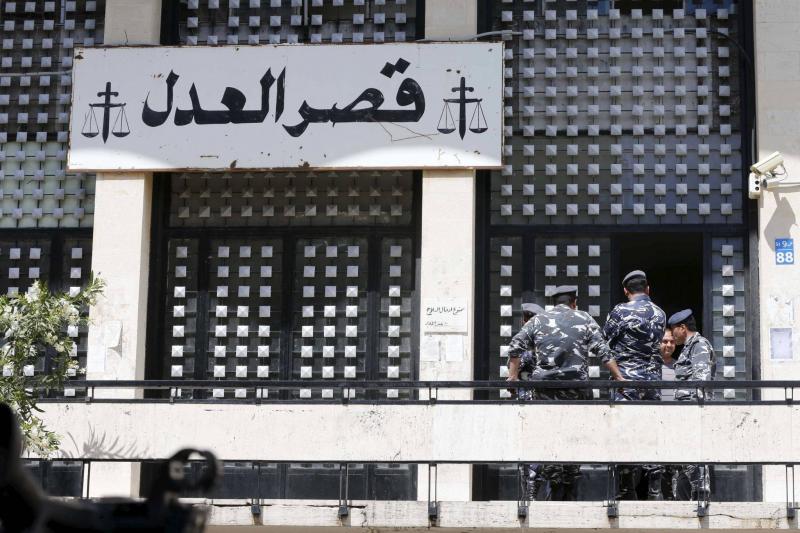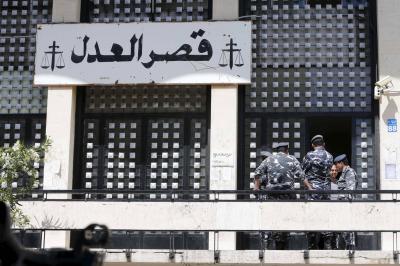For nearly five months, the country has been without a judicial authority. It is incomprehensible how a state continues to function while its judges are on strike, without addressing their situation to manage the cases of individuals and detainees, and uphold justice. Moreover, it is unclear why no action has been taken beyond media calls for judges to return to their work. Those entering the courthouse would find it deserted, with only a handful attending to urgent necessities while others are absent in protest against their deteriorating living conditions.
The Supreme Judicial Council was supposed to hold a meeting yesterday to discuss the judges' strike, but the meeting did not take place due to a lack of quorum. Judicial sources indicate that the head of the Supreme Judicial Council, Souheil Aboud, was about to take action regarding the investigation into the Beirut port file and the acting judge, prompting some judges to deliberately abscond to prevent any decisions on the matter.
Whether the meeting occurs or not, since the judges' strike began, the Supreme Judicial Council has been vocally demanding that judges return to their usual duties. The relationship between the council and the judges has not been good since the strike began. Their grievances regarding the council's handling of their rights have not met the expected or required standards. Since the decision to pay judges' salaries at an exchange rate of 8,000 Lebanese pounds to the dollar was revoked, the Supreme Judicial Council has not made any noteworthy efforts amidst rumors circulating within judicial circles accusing some senior judges in the council of rejecting a proposed settlement regarding judges' salaries to avoid any perception of discrimination in favor of judges over others, while they receive their salaries based on a rejected formula for their peers.
Judges are tired of accumulated promises without practical measures that serve their interests, with a consensus among the majority of them not to resume work until their conditions are revisited. They lament the state's indifference to their demands while priority is given to the workers and employees of OGERO, with part of their salaries paid in fresh dollars, causing judges to wish they could be employees there.
For four months, judges have not been a priority for the state or government. In the latest promises conveyed to them, judges would be included in a scheme that multiplies their salary by three, but the condition of this measure, applicable to the public sector, is that it should not exceed a ceiling of 12 million Lebanese pounds, which does not suit judges’ salaries because the resultant difference would not be substantial. Another proposal is under consideration to calculate one of the three salaries based on a value of 1,500 pounds multiplied by 8,000, to be dispensed via the central bank and not through the state treasury. Judges are cautious that this proposal could meet the same fate as previous ones and are avoiding discussing its details.
The lack of quorum in the Supreme Judicial Council has become a means for the council to evade its responsibilities toward the judges, but the council is not distant from taking steps to address this highly sensitive matter for an authority entrusted with people's livelihoods and oversight. Five months without a judicial authority, and officials have taken no action, despite the fact that the judiciary's continued fulfillment of its duties is essential for the concept of state and law. How can a country manage its affairs with justice suspended? How can the political authority and the Minister of Justice accept the continuation of such a reality?
Judicial sources, responding to a question about the Minister of Justice's role, stated that the minister had initially refused to sign the letter from Riad Salameh regarding adjustments to judges' salaries, but once his name was mentioned in connection with a forthcoming cabinet reshuffle, he rectified the matter and signed the letter!
Judges await "divine intervention" to resume their work, and high judicial sources confirm that they will continue their boycott until their living conditions are rectified, dismissing the pretext of equating the judicial corps with other public sectors, as there is no equivalence between the judiciary and the rest of the public sector; the judiciary is an authority in the constitution and is subject to its own judicial system.
The state is not the only entity conspiring against the judiciary, which fails to uphold the rights of judges; injustices also come from within. The judicial body is not in a good state. The issue is not merely about improving and adjusting salaries; it is a matter of corruption that affects nearly everyone. In the judiciary, even the highest-ranking individuals conspire against their junior colleagues. How can justice prevail when the majority of its advocates are not just?




